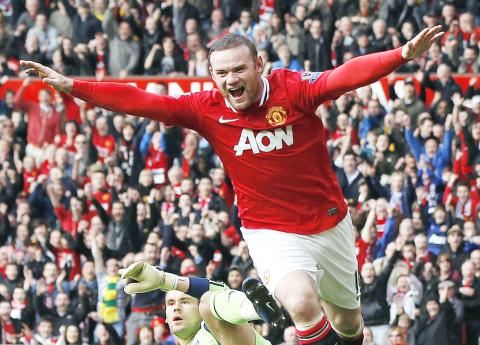Manchester United has picked the New York Stock Exchange to make its stock market debut, ending months of speculation over where the world’s best-supported soccer club would list.
After first eyeing a Hong Kong initial public offering (IPO), the former English Premier League champions had planned a US$1 billion listing in Singapore in the second half of last year before putting plans on hold because of market turmoil.
The US-owned club filed with the Securities and Exchange Commission on Tuesday to raise up to US$100 million in an IPO of its Class A ordinary shares in New York.

Photo: Reuters
In the US, the amount of money a company says it plans to raise in its first IPO filings is used to calculate registration fees. The final size of the IPO could be different.
The club has been English champions a record 19 times and features players such as England’s Wayne Rooney. The company filing for a much lower amount than the US$1 billion originally expected does not come as much of a surprise, said Josef Schuster, founder of Chicago-based financial services firm IPOX Schuster LLC.
“The smaller the float, the higher the relative valuation can be ... This may just be a strategy initially to make it appear like a low float IPO,” Schuster said. “Traders may believe if the deal is very low, then the company can pop at the opening.”
Manchester United has a global fan base of 659 million, according to a survey commissioned by the club and carried out last year by market researcher Kantar. Almost half of United’s supporters were in the Asia-Pacific region.
“It remains to be seen how much the football [soccer] club is going to benefit in the US where the sport is not very popular ... The perfect place for it to have listed should have been London,” said Jay Ritter, a University of Florida IPO expert.
The club, founded in 1878 as Newton Heath LYR Football Club, plays its home games at Old Trafford in Greater Manchester. The club’s proprietors, the Glazer family, are well known in the US as owners of the US football team the Tampa Bay Buccaneers.
However, they have faced opposition from United fans after taking over the club in 2005 in a leveraged buyout that left it saddled with hefty debt repayments.
The club’s total debt as on March 31 was £423.3 million (US$663.67 million), according to the filing. It intends to use the net proceeds from the offering to repay debt.
United did not reveal how many shares it plans to sell or the expected price.

BYPASSING CHINA TARIFFS: In the first five months of this year, Foxconn sent US$4.4bn of iPhones to the US from India, compared with US$3.7bn in the whole of last year Nearly all the iPhones exported by Foxconn Technology Group (富士康科技集團) from India went to the US between March and last month, customs data showed, far above last year’s average of 50 percent and a clear sign of Apple Inc’s efforts to bypass high US tariffs imposed on China. The numbers, being reported by Reuters for the first time, show that Apple has realigned its India exports to almost exclusively serve the US market, when previously the devices were more widely distributed to nations including the Netherlands and the Czech Republic. During March to last month, Foxconn, known as Hon Hai Precision Industry

Taiwan Semiconductor Manufacturing Co (TSMC, 台積電) and the University of Tokyo (UTokyo) yesterday announced the launch of the TSMC-UTokyo Lab to promote advanced semiconductor research, education and talent development. The lab is TSMC’s first laboratory collaboration with a university outside Taiwan, the company said in a statement. The lab would leverage “the extensive knowledge, experience, and creativity” of both institutions, the company said. It is located in the Asano Section of UTokyo’s Hongo, Tokyo, campus and would be managed by UTokyo faculty, guided by directors from UTokyo and TSMC, the company said. TSMC began working with UTokyo in 2019, resulting in 21 research projects,

Ashton Hall’s morning routine involves dunking his head in iced Saratoga Spring Water. For the company that sells the bottled water — Hall’s brand of choice for drinking, brushing his teeth and submerging himself — that is fantastic news. “We’re so thankful to this incredible fitness influencer called Ashton Hall,” Saratoga owner Primo Brands Corp’s CEO Robbert Rietbroek said on an earnings call after Hall’s morning routine video went viral. “He really helped put our brand on the map.” Primo Brands, which was not affiliated with Hall when he made his video, is among the increasing number of companies benefiting from influencer

Quanta Computer Inc (廣達) chairman Barry Lam (林百里) yesterday expressed a downbeat view about the prospects of humanoid robots, given high manufacturing costs and a lack of target customers. Despite rising demand and high expectations for humanoid robots, high research-and-development costs and uncertain profitability remain major concerns, Lam told reporters following the company’s annual shareholders’ meeting in Taoyuan. “Since it seems a bit unworthy to use such high-cost robots to do household chores, I believe robots designed for specific purposes would be more valuable and present a better business opportunity,” Lam said Instead of investing in humanoid robots, Quanta has opted to invest